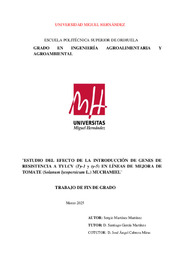Resumen :
En el Programa de Mejora de Variedades Tradicionales de Tomate del CIAGRO-UMH, se logró incorporar con éxito en las líneas Muchamiel los genes Tm-2a (que proporciona resistencia al ToMV), Sw-5 (que otorga resistencia al TSWV) y Ty-1 (que brinda tolerancia al TYLCV). No obstante, se ha detectado que la inclusión del gen Ty-1 tiene efectos negativos, ya que las líneas mejoradas con este gen muestran características agronómicas y organolépticas inferiores en comparación con sus progenitores. Por ello, se está considerando la posibilidad de explorar alternativas, entre ellas la incorporación del gen ty-5, que también ofrece tolerancia al TYLCV.
Este estudio analiza el impacto de la introducción de los genes Ty-1 y ty-5 en dos líneas de tomate Muchamiel procedentes del programa de mejora. Para ello, se evaluaron características agronómicas (como el número de frutos por planta, el peso promedio de los frutos y la producción total) y de calidad (incluyendo el contenido de sólidos solubles y la acidez valorable).
Una vez analizados los resultados obtenidos en este ensayo podemos ver que el gen Ty-1 tiene ningún efecto negativo sobre la producción, peso medio y acidez total, mientras que no lo tiene sobre el número de frutos y sólidos solubles. En el caso del gen ty-5, los resultados muestran que este si tiene un efecto negativo sobre la producción, número de frutos, peso medio y acidez total, siendo poco apreciable en cuanto al número de frutos y a la acidez total y no teniendo efecto negativo en el parámetro de sólidos solubles totales.
In the CIAGRO-UMH´s Traditional Tomato Varieties Improvement Program, the genes Tm-2a (which provides resistance to ToMV), Sw-5 (which provides resistance to TSWV) and Ty-1 (which provides tolerance to TYLCV) were successfully incorporated into the Muchamiel lines. However, it has been detected that the inclusion of the Ty-1 gene has negative effects, since the lines improved with this gene show inferior agronomic and organoleptic characteristics compared to their parents. Therefore, the possibility of exploring alternatives is being considered, including the incorporation of the ty-5 gene, which also offers tolerance to TYLCV.
This study analyzes the impact of the introduction of the Ty-1 and ty-5 genes in two Muchamiel tomato lines from the breeding program. To this end, agronomic characteristics (such as the number of fruits per plant, average fruit weight and total production) and quality characteristics (including soluble solids content and titratable acidity) were evaluated.
Once the results obtained in this trial have been analyzed, we can see that the Ty-1 gene has no negative effect on production, average weight and total acidity, while it does not have any negative effect on the number of fruits and soluble solids. In the case of the ty-5 gene, the results show that it does have a negative effect on production, number of fruits, average weight and total acidity, being little noticeable in terms of the number of fruits and total acidity and having no negative effect on the parameter of total soluble solids.
Key words:
|
 La licencia se describe como: Atribución-NonComercial-NoDerivada 4.0 Internacional.
La licencia se describe como: Atribución-NonComercial-NoDerivada 4.0 Internacional.
.png)
